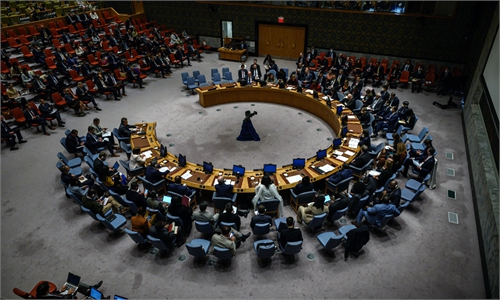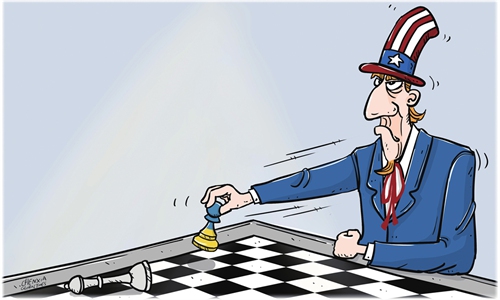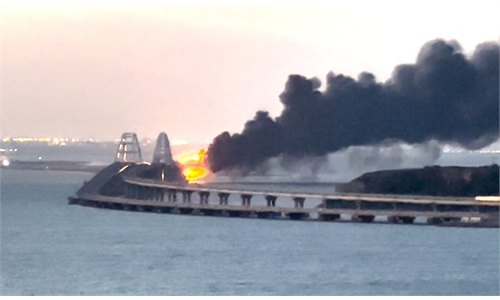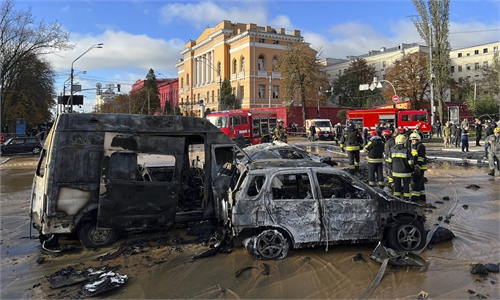Russia conducts large-scale, retaliatory strikes on Kiev as Ukraine asks for more support from ‘exhausted West’
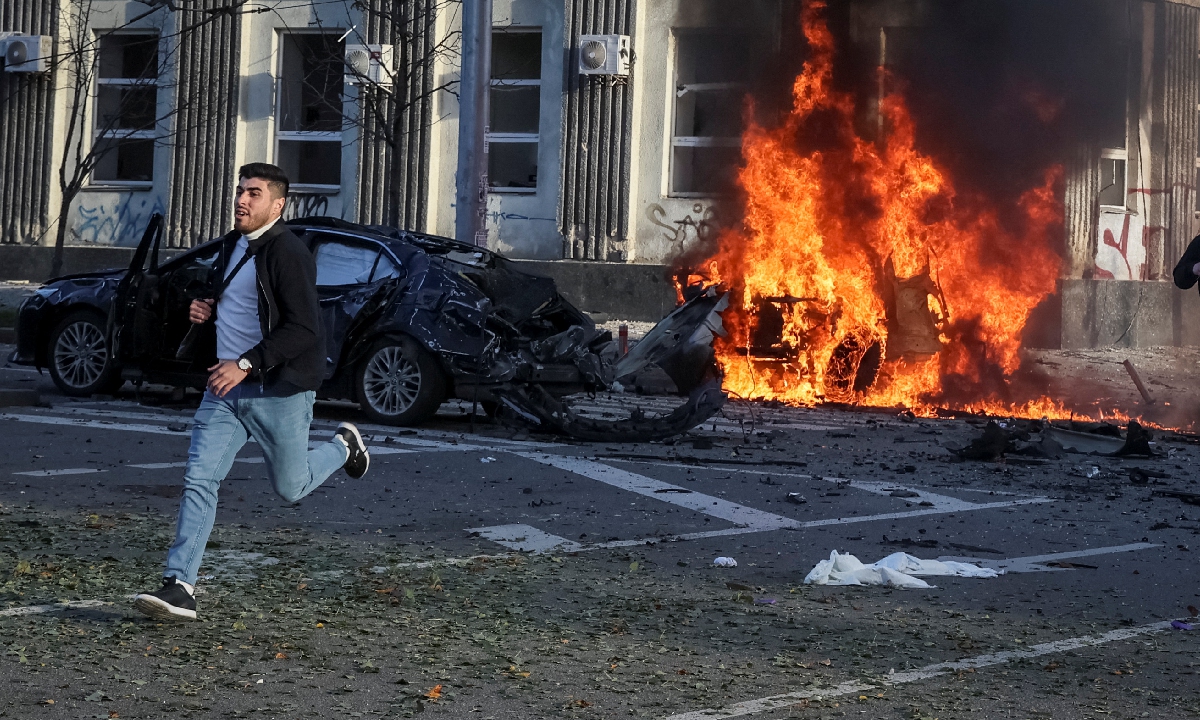
A man runs from a burning site after Russian strikes hit the Ukrainian capital Kiev on October, 10, 2022. Photo: IC
Hours after Russian President Vladimir Putin blamed Ukraine for the Crimean Bridge explosion and calling the blast "a terrorist act," several Ukrainian cities came under missile attacks. Chinese experts believe the bridge blast may free Russia from targeting only military facilities and that Moscow may extend its attacks against important Ukrainian administrative and political objects and important infrastructure, which will escalate the conflict to another stage.
Mao Ning, spokesperson of China's Ministry of Foreign Affairs, said Monday at a routine press briefing that China noted relevant reports (of blasts in Ukrainian cities) and hopes the situation will de-escalate as soon as possible. China hopes all parties will properly address their differences through dialogue and consultation. China stands ready to continue to play a constructive part in de-escalation efforts, Mao said.
The Chinese Embassy in Ukraine issued a warning on Monday, saying the security situation in Ukraine is severe as the whole country faces frequent air raids. The embassy urged all Chinese nationals to avoid coming or returning to Ukraine, and those who are determined to stay should prepare for emergencies and avoid risks.
Despite Russia's fierce reprisals after the bridge blast incident, observers believed that nuclear weapons are off the table for Moscow. However, they said that because of the suddenly intensified tensions, the US and other Western countries should slam on the brakes and not fan the flames of the crisis. The current situation is on a knife edge and any provocative move at this time will set off a powder keg, while Western countries have exhausted much of their military resources.
Two days after the explosion damaged the Crimean Bridge, or Kerch Bridge, Putin accused Ukraine of attacking the infrastructure, as per reports from RT.
"Ukraine's special services were the initiators, performers and masterminds," Putin said when meeting with Chairman of the Russian Investigative Committee Alexander Bastrykin. The attack on the bridge was aimed at Russia's "critical infrastructure," Bastrykin said, calling it "an act of terrorism."
"So, as you just reported, there is no doubt," Putin said. "It was ordered, planned and carried out by the Ukrainian security services."
Loud explosions were heard in the Ukrainian capital of Kiev on Monday morning, media reported. One of the rockets fell near the street where the Security Service of Ukraine is located in Kiev, and the office of the Ukrainian president is located nearby, Russian news agency RIA Novosti reported.
"Ukraine is under missile attack. There is information about strikes in many cities of our country," Kyrylo Tymoshenko, deputy head of the president's office, said on social media, calling on the population to "stay in shelters".
Putin confirmed that Russian troops carried out a "massive strike with long-range precision weapons on Ukrainian objects of energy, and military control and communications."
If Ukraine orchestrates further terrorist attacks against Russia, there will be a significant military response similar to the one launched on Monday, RT quoted Putin as saying.
Chinese observers predicted that a full-blown escalation of the Russia-Ukraine crisis would follow after the Russian authority's recognition of the incident as an "act of terrorism," as well as the attacks on Ukraine cities.
After identifying Ukraine as being behind this incident, Russia probably won't confine itself to attacking only military targets, Cui Heng, an assistant research fellow from the Center for Russian Studies of East China Normal University, told the Global Times on Monday.
Echoing Cui's view, Zhang Hong, an associate research fellow at the Institute of Russian, Eastern European and Central Asian Studies of the Chinese Academy of Social Sciences (CASS), told the Global Times on Monday that Russia's ensuing countermeasures are likely to target Ukraine's important administrative and political figures, objects and important infrastructures, such as Ukraine's traffic system.
However, Cui predicted that although tensions are spiraling, Russia is very unlikely to unleash its nuclear weapons, as it is not a matter of an invasion into Russia or a threat to Russia's existence, and the impact on Kerch Bridge is pretty limited as it has already resumed operations.
Kremlin spokesperson Dmitry Peskov also said on Monday it was "completely incorrect" to suggest Moscow could respond by using nuclear weapons.
Slamming the brakes
G7 leaders and Ukrainian President Volodymyr Zelensky will hold emergency talks on Tuesday to discuss the latest development in Ukraine, AFP reported on Monday. German Chancellor Olaf Scholz spoke by phone to Zelensky and assured him of Berlin's continued support, German government spokesman Steffen Hebestreit said on Monday, according to AFP.
After the bridge blast on Saturday, Anton Herashchenko, an advisor to Ukraine's Interior Minister, on Sunday urged the West to increase supplies of weapons to Kiev, fearing Russia's response to the incident, Russian media Vzglyad reported.
However, Chinese experts said when the conflict has dragged on for almost eight months and is likely to further escalate due to the bridge blast, Western countries' support, including weapon supplies to Ukraine, may actually dwindle.
"The US wants the conflict to exhaust Russia and Europe, not to have them perish together. Thus as the tension comes to a tipping point of being out of control, the West may jam on the brakes," said Cui.
US stockpiles of the equipment that is essential to Kiev's battle are "reaching the minimum levels needed for war plans and training," and restocking to pre-crisis levels could take years, Mark Cancian of the Center for Strategic and International Studies wrote in a recent analysis, AFP reported in August.
"The military stocks of most [European NATO] member states have been, I wouldn't say exhausted, but depleted in a high proportion, because we have been providing a lot of capacity to the Ukrainians," Josep Borrell, EU's high representative for foreign affairs and security policy, said earlier September.
Zhang Heng from CASS believed it will be wise for the US and other Western countries to jam on the brakes and contribute to calming down the tensions.
